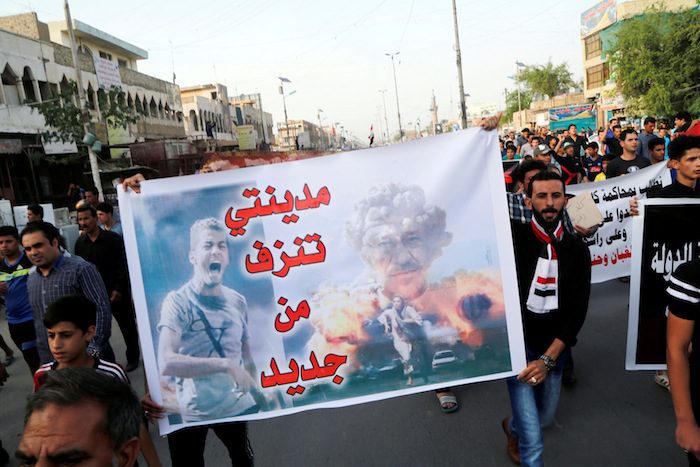
|
| Baghdad demonstrators protest against security forces, whom they claim are not able to protect them, May 12 |
DEARBORN — As the triple suicide bombings hit Baghdad, killing more than 80 people, the terror was felt by the Iraqi diaspora.
Iraqi American humanitarian Nidhal Garmo, who returned from an aid mission to Iraq in March, said she could not stop crying since watching the graphic images of the attacks.
“My heart aches for my people,” she said. “They are innocent. They are poor. They are just trying to live.”
Garmo warned against sectarian divisions in her homeland and the local Arab American community.
“The terrorists’ plan is to spread sectarianism,” she said. “They attack Shi’a; they attack Sunnis; they’re killing everybody. But they won’t succeed.”
During her visit to Iraq, Garmo travelled to the frontlines with Kurdish Peshmerga fighters in northern Iraq.
She said the country is in dire need of humanitarian aid. Garmo called on the U.S. government to step up efforts to help Iraqis.
Kamal Alsaedi, a local Iraqi American activist, said Iraqi expatriates feel agony and despair because of the bloodshed in Baghdad.
“We are crying blood from the intensity of our pain,” he said.
Alsaedi pointed the finger at Saudi Arabia, Qatar and Turkey, accusing them of supporting extremists.
He urged the Iraqi government to shut down the embassy of “the trio of evil,” as he called them.
Alsaedi did not spare Iraqi politicians the criticism. He said they are corrupt and failing to safeguard the country.
The Dearborn-based activist said ISIS is becoming bloodier and more erratic as it loses territories.
Imam Talib Sanjari, a local Iraqi Muslim scholar, said defenseless civilians are the biggest victims of war.
“Daesh and those who stand behind it, and those who came to power by force are partners in exterminating the Iraqi people,” he said.
The imam said any ideology that encourages violence and murder should be rejected.
Activists pointed to the discrepancy between the apathetic reaction to the bloodshed in Iraq, compared to the overwhelming support that Western cities receive after terrorist attacks.
“So is Twitter #JeSuisBaghdad-ing today? Cool Facebook profile pic overlay of the Iraq flag?” wrote Twitter user @bexology_.
Faisal Al Mutar, a New York-based Iraqi American human rights advocate, said terrorism has become a constant reality in Iraqis’ lives. He is angry at “apologists” who have been indifferent to the suffering of Iraq over the past years but now scold others for not showing social media compassion with the country.
“When was the last time you have changed your profile picture to the Iraqi Flag? We have terrorist attacks happening every day,” said Al Mutar.
Al Mutar pointed to the amplified sympathy during 9/11 anniversaries, and the absence of such homage to those murdered in Iraq throughout the years.
“We have a 9/11 every day in Iraq,” he said.
Al Mutar’s brother was killed by al-Qaeda militants in 2007. He said his family are the only ones who grieve and commemorate him.
“If people in the region still look at everything through sectarian lenses, don’t be surprised if terrorism will continue until the end of days,” he added.
Al Manhal Al Safi, the consul general of Iraq in Detroit, said the “senseless” attacks were carried out by “thugs” who had no other motive than to kill innocents.
He said the Iraqi government is engaged on the frontlines against ISIS, even more so than Syria. He added that the army is on the offensive and Iraq is constantly sharing intelligence data with the United States government to counter extremism.
But it’s never that easy. Al Safi added that modern terrorists continuously update their “evil” methods to keep up with high-tech counterterrorism efforts.
Al Safi said suicide bombers are difficult to stop, whether they are in Iraq, Belgium or anywhere.






Leave a Reply